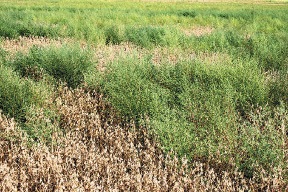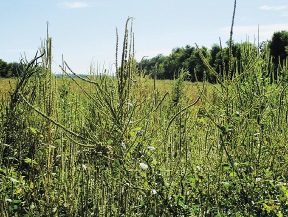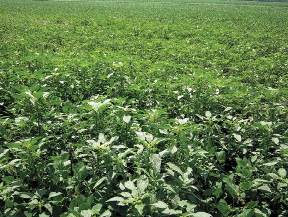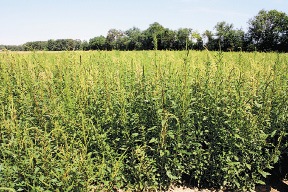 So far, no glyphosate resistant weeds have been reported in Idaho, Montana, Washington or Wyoming, and only Italian ryegrass has been reported resistant in Oregon.
So far, no glyphosate resistant weeds have been reported in Idaho, Montana, Washington or Wyoming, and only Italian ryegrass has been reported resistant in Oregon.
Thankfully, Italian ryegrass is not a weed problem in eastern Oregon or southern Idaho, where sugarbeets are grown. Montana is in the process of confirming whether they have glyphosate-resistant kochia that may have crept into northern Montana from Alberta, Canada.
In the Midwest, southern and eastern parts of the U.S., horseweed (Conyza canadensis), Palmer amaranth (Amaranthus palmeri), common waterhemp (Amaranthus tuberculatus) and giant ragweed (Ambrosia trifida) are the most common weeds resistant to glyphosate.
Kochia (Kochia scoparia) is becoming more widespread as well. We are fortunate not to have Palmer amaranth, common waterhemp or giant ragweed in Idaho or eastern Oregon. However, we do have horseweed and lots of kochia. And just because we may not have some of these weeds does not remove the threat of other weeds becoming glyphosate resistant.
Apparently, Michigan now has glyphosate resistant Palmer amaranth that came into their state via contaminated cotton seed used for livestock feed. Cotton seed is a common feed supplement for livestock in Idaho as well.
It's easy to see how devastating glyphosate resistance is when you look at pictures of fields infested with glyphosate resistant weeds. Weed science colleagues who provided these photos from Michigan, Illinois and Kansas report that glyphosate resistance has spread across wide areas in each state. These images illustrate the importance of preventing glyphosate resistant weeds from developing. What's even worse for sugarbeet growers is that the options for controlling weeds in beets are few. Unlike soybeans and corn, which had many other herbicides labeled for use in these crops, there weren't many herbicides registered for use in sugarbeets that were that effective before Roundup Ready beets came along.
If glyphosate resistant weeds do become a problem in sugarbeets, growers will be faced with the same challenges they had with weed control in conventional beets.
In 2012, the Weed Science Society of America published a series of articles about herbicide resistance management. Included in the articles was a list of best management practices or BMPs for resistance management. The following list includes most of those recommendations with some additional suggestions specific to sugarbeet production.
1) Do not grow a Roundup Ready crop more than once every four years in any given field.
2) In non-Roundup Ready crops, avoid using glyphosate as a broadcast application before the crop emerges or after harvest.
3) Tank mix or use another herbicide with glyphosate when it is used in sugarbeets. For example, Nortron can be applied preplant, pre-emergence or postemergence in sugarbeets, which means it can be used with or without glyphosate. Other herbicides that can be tank-mixed with glyphosate in sugarbeets include Dual Magnum, Eptam, Outlook, Treflan and Betamix. It is important to keep in mind that none of these herbicides, except Betamix, will control any weeds that have already emerged.
4) Apply the labeled glyphosate rate at recommended weed sizes. In Roundup Ready sugarbeets and corn, the minimum application rate when the weeds are less than about 2-to-3 inches is 0.75 pounds acid equivalent per acre. This is equivalent to 22 fluid ounces per acre of Roundup PowerMax. If a different brand or formulation with less active ingredient is used, more product per acre will need to be applied in order to apply 0.75 pounds acid equivalent per acre. Also, consider adding ammonium sulfate if environmental conditions are dry.
5) Scout fields for escapes or new invaders.
6) Do not let any weeds that have survived herbicide application produce seed.
There is no guarantee that following these recommendations will keep glyphosate resistant weeds fromshowing up in eastern Oregon and Idaho. It is a guarantee that glyphosate resistant weeds will become a problem if these herbicide resistance management strategies are ignored.



